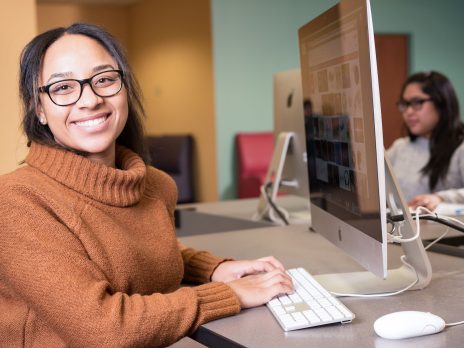Information Literacy Resources for General Studies
The resources on this site will supply you with assignments and ideas for integrating information literacy skills into your General Studies course.
- Foundation Recommendation (ENG 105 and ENG 205): Information Literacy Basics Tutorial.
- Knowledge Area Requirement: One of the three (A, B or C) Information Literacy Learning Goals.
- Junior Level Writing Requirement: One of the three (A, B or C) Information Literacy Learning Goals.
- Capstone Requirement: One of the three (A, B or C) Information Literacy Learning Goals.
If you would like additional assistance, contact your department’s subject librarian. We regularly partner with faculty to develop tailored assignments and online resources to support information literacy.
Learning Goal A
Goal Accordion Open
Recognize and describe how new information is generated and vetted, as well as how and why it’s communicated to others through different types of sources.
Assignment Ideas
Guiding Questions Accordion Closed
- How do scholars, experts, or other professionals in your discipline generate new information, ideas, products, inventions, or creative works? Through research, testing and development, creative activities, etc.?
- What processes (if any) are in place to ensure the quality, reliability, and/or originality of this output? Through peer-review, fact-checking, standards, copyright, patents, etc.?
- How is this output communicated and shared with other scholars, experts, or professionals? Through journals, books, online forums, etc.? What is the purpose of sharing output with this audience?
- How is this output communicated and shared with the general public? Through newspaper articles, magazine articles, blogs, websites, etc.? What is the purpose of sharing output with this audience?
Learning Goal B
Goal Accordion Open
Effectively find, evaluate, and use information sources.
Assignment Ideas
Guiding Questions Accordion Closed
Guiding questions for understanding sources:
- Can you identify different source types when you encounter them online?
- How do different types of information sources solve different information problems? In other words, when and why would you seek information in a book versus a journal versus a newspaper article versus a website, etc.?
Guiding questions for finding sources:
- How do you find and select appropriate databases to find sources?
- How do you effectively search databases using keywords and synonyms? Why do keywords retrieve better results than searching using sentences?
Guiding questions for choosing sources:
- When examining search results, how do you decide which are the most relevant to your information need?
- When is it important to have high quality, credible results? Are there information needs for which quality and credibility are less important?
- What techniques can you employ to determine if a source is credible? Do novice researchers use different techniques than expert researchers?
Guiding questions for citing sources:
- Why do creators refer to outside sources? What does this achieve?
- How do you incorporate sources into your work? How do you decide whether to quote, summarize, or paraphrase?
- What are citations and how do you find the elements to construct them? What are the mechanics of citing within your text and how do you use a style guide?
Learning Goal C
Goal Accordion Open
Judge the utility, quality, and extent of information needed in making decisions.
Assignment Ideas
Guiding Questions Accordion Closed
- What types of future information needs require thorough, comprehensive searching in order to gather and refer to lots of sources before making a decision, plan, best practice, or policy change? When and how do you know when you’ve searched comprehensively and/or found enough?
- Provide students with a future scenario that requires finding high quality research information. For that situation, what types of information would you look for and why? What types of information would be inappropriate and/or less useful to use?
- Provide students with a future scenario that requires finding information that’s not research and/or is lower stakes. For that situation, what types of information would you look for and why? What types of information would be less appropriate and/or less useful to use?
- How do your information seeking strategies differ for questions 2 and 3 above? Why do some scenarios or decisions require thorough searching and/or finding high quality, credible sources, while others don’t?
- When searching the web (Google) for information, what should you believe and under what circumstances should you be wary about the reliability of the information you’re viewing?


